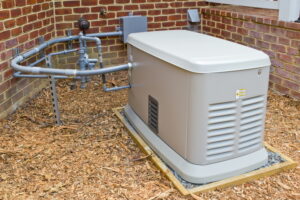If you’re considering a generator for your home, you have two choices: A stand-alone portable generator or oven, or a small window air conditionera whole-house generator. Portable generators may seem like a simple choice, but they can be costly and potentially dangerous to operate. The alternative is a whole-house generator that is ready to switch on automatically whenever the need arises.
Portable Generators vs. Whole-House Generators
A portable generator is usually smaller and designed to run a few home appliances for a short period of time. Construction sites often use portable generators to power their tools and equipment. If the power goes out in your home, you can use a portable generator to supply energy to your fridge, oven, or a small window air conditioner. They typically run on gasoline, so you need to have fuel on hand in case of emergencies, unlike a whole-house generator powered by natural gas for reliable backup.
A whole-house generator is larger in both size and use. It connects directly to your home’s source of natural gas or propane and automatically turns on if the electrical grid goes out. You choose which appliances get priority and even have a whole-house generator strong enough to power everything in your home.
Reasons to Choose a Whole-House Generator
A whole-house generator connects directly to your home’s electrical system in addition to your natural gas or propane source. Sensors identify when the power goes out and switches on automatically to power your home. Additional benefits include features that ensure your generator is ready whenever you need it:
- Always on standby – Your generator is always ready to turn on. If the power goes out while you’re away at work, you don’t have to worry about manually turning it on.
- Fuel efficient – Natural gas is a better fuel source than gasoline fuel that you’d put in your car. Your whole-house generator creates electricity with minimal natural gas usage. Plus, you don’t have to worry about refilling the fuel tank or running out of fuel.
- Safe to use – Portable generators use gasoline that produces carbon monoxide fumes. If you don’t have an outdoor area to store the generator, these fumes can get trapped in your home or garage. They also create fire risks. Natural gas offers a cleaner burn and is already hooked up to your house for constant use.
Maintenance for a Whole-House Generator
Portable generators can be a cheaper option, but they may not last as long as a whole-house generator. Your standby generator may be approved to run for thousands of hours with proper maintenance, which includes:
- Checking spark plugs
- Changing out filters
- Reviewing switches
- Ensuring the alternator is in peak condition
- Lubricating all parts
With proper maintenance, a whole-house generator can last you for years to come. That way when your power goes out your generator is ready to keep food cold and home comfortable, appliances ready for use, and lights operating throughout your home:
- Keep your refrigerator running and food cold
- AC unit operating and home cooled or heated
- Appliances ready for use
- Lights operating throughout your home
Frequently Asked Questions
Question: What is a whole‑house generator and how does it differ from a portable generator?
Answer: A whole‑house generator, also known as a standby generator, is a permanently installed system connected to your home’s electrical panel and gas source. It automatically activates during power outages to supply electricity. In contrast, a portable generator is a smaller, manual-use option that runs on fuel like gasoline and typically powers only select appliances.
Question: What are the main benefits of installing a whole‑house generator?
Answer: Whole‑house generators offer automatic operation with immediate power during outages, fuel-efficient and clean energy via natural gas or propane, and peace of mind whether you’re home or away. They also help prevent food spoilage, protect home systems like heating and security, and often increase property value.
Question: What are the disadvantages or considerations before installing a whole‑house generator?
Answer: The primary downsides include high upfront costs, the need for sufficient outdoor space, ongoing maintenance, fuel dependency, and potential noise. Installation may require permits and professional work. Plus, it may sit unused for long periods, depending on outage frequency.
Question: How much does a whole‑house generator installation cost?
Answer: Prices vary widely. Basic whole-house units can range from around $5,000 to $25,000 or more depending on size, fuel type, installation complexity, and permits. Installation labor, transfer switches, concrete pads, and electrical work all add to the total.Question:Do whole‑house generators add value to a home?
Answer: Yes, they often enhance resale appeal and can even boost home value by a notable percentage. Buyers appreciate the safety, convenience, and reliability they bring, especially in outage-prone areas. Some estimates suggest a return of 50–70% of the generator cost in added home value.
At Covenant Heating and Cooling, we are “Dedicated to the Promise of Serving You!” Contact us today to schedule installation and maintenance to prevent the need for generator repair in Nashville, TN, and whatever other generator services you need.

